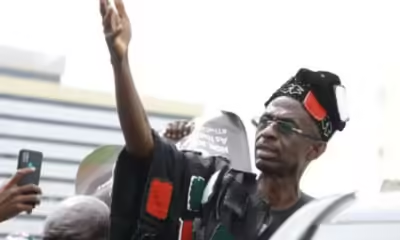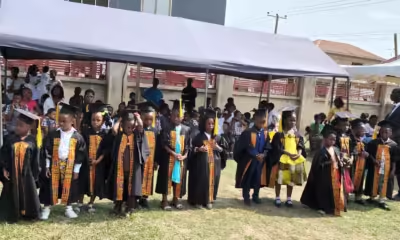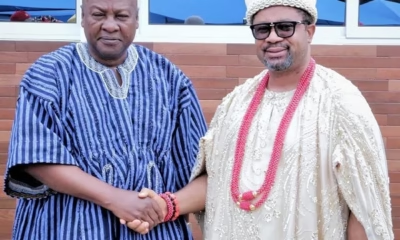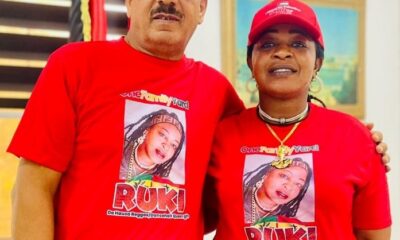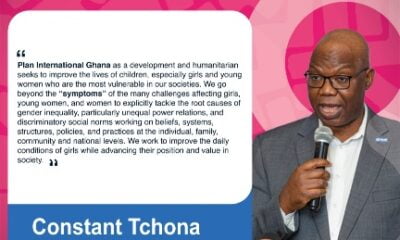Africa
G20 foreign ministers gather amid tensions over trade, Ukraine
Published
3 months agoon

Foreign ministers from the G20 top economies were to meet in South Africa on Thursday and Friday, amid tensions between members over the Ukraine war, trade disputes and with the top U.S. diplomat staying away owing to a feud with the hosts.
The G20 countries, which represent some 85 per cent of global GDP and three quarters of trade, often struggle to see eye to eye, but geopolitical rifts since Russia’s 2022 Ukraine invasion have rendered it more fractious than ever.
The discord has increased since President Donald Trump took office a month ago and implemented rapid changes in Washington’s trade and foreign policies.
South Africa holds the rotating presidency of the group and for President Cyril Ramaphosa the first G20 meeting in Africa was an opportunity to get rich nations to heed poorer countries’ concerns – worsening inequality, inadequate action on climate change, and a financial system that favours investment banks over poor sovereign debtors.
But the United States won’t be attending: Secretary of State Marco Rubio earlier this month rejected as “very bad” the previously agreed agenda of “diversity, equity and inclusion”.
Then Trump in cut U.S. aid to South Africa in an ideological dispute with the latter’s efforts to redress historic racial injustices land ownership – and over its genocide case against U.S. ally Israel at the International Court of Justice.
The gathering takes place as Trump has upended the U.S. policy of solidarity with Ukraine as he seeks to broker peace in its war with Russia. He has blamed President Volodymyr Zelenskiy for the conflict, and sidelined NATO allies in ending a campaign to isolate Russia.
The U.S. absence is an opportunity for China, which has the world’s second biggest economy, to expand its influence. Such efforts by Beijing are normally focused on the Global South but China has quickly sought to capitalise on the cracks in the transatlantic alliance. -REUTER
You may like
Africa
South Africans exasperated by Trump false claims during Ramaphosa meeting
Published
1 week agoon
May 23, 2025
South Africans expressed dismay on Thursday at how U.S. President Donald Trump’s false claims of a white genocide dominated a conversation with President Cyril Ramaphosa, and many wondered if his trip to Washington was worth the trouble.
Ramaphosa included popular white South African golfers in his delegation and he had hoped talks with Trump in the White House on Wednesday would reset relations with the United States, which have nosedived since the U.S. leader took office in January.
But Trump spent most of the conversation confronting his visitor with false claims that South Africa’s white minority farmers are being systematically murdered and having their land seized.
“He didn’t get Zelenskyed. That’s what we have to hang onto (He) did not get personally insulted by the world’s most horrible duo of playground bullies,” Rebecca Davis of the national Daily Maverick wrote.
At a February White House meeting, Trump and Vice President JD Vance berated Ukrainian President Volodymyr Zelenskiy, calling him ungrateful for U.S. military aid, and Zelenskiy heatedly tried to argue his case.
For some, though, Ramaphosa’s cool composure raised the question of what was achieved by his having subjected himself to the onslaught.
“I don’t think it was the right call. I don’t think we need to explain ourselves to USA,” 40-year-old Sobelo Motha, a member of a trade union, said on the streets of Johannesburg.
“We … we know there’s no white genocide. So for me, it was pointless exercise.”
The South African president arrived prepared for an aggressive reception given actions in recent months by Trump, who has canceled aid to South Africa, offered refuge to white minority Afrikaners, expelled the country’s ambassador and criticised its genocide court case against Israel.
But throughout, Trump wanted only to discuss the treatment of white South Africans, playing a video and leafing through articles that he said proved his allegations.
—Reuters
Africa
Kenyan officer deployed to Haiti killed in violent gang encounter
Published
3 months agoon
February 25, 2025
A kenyan police officer deployed to Haiti to assist in combating violent gangs was killed during a confrontation with one of the gangs, according to Kenyan officials on Sunday.
The incident occurred in the Artibonite region, where Kenyan forces were engaged in operations to address gang violence.
The Kenyan mission reported that the officers were responding to a request for assistance from residents in Pont-Sonde.
The officer was airlifted for medical treatment but succumbed to his injuries, as stated by Godfrey Otunge, the commander of the Kenyan contingent in Haiti.
Following the shooting, the officers pursued the assailants. Mission representative Jack Ombaka expressed gratitude to hospital personnel and Salvadoran forces for their support after the incident.
“This is the sacrifice our brave officer made — he lost his life while defending the people of Haiti,” Ombaka remarked.
The Gran Grif gang is known to dominate the area.
This loss is a setback for efforts to control Haiti’s gangs, which have been rampant since the assassination of President Jovenel Moïse in 2021.
Kenya has deployed hundreds of officers to support Haiti’s struggling law enforcement, with an additional 200 officers arriving in February to join over 600 already present, as part of a multinational force that includes personnel from Jamaica, Guatemala, and El Salvador.
—Africa News
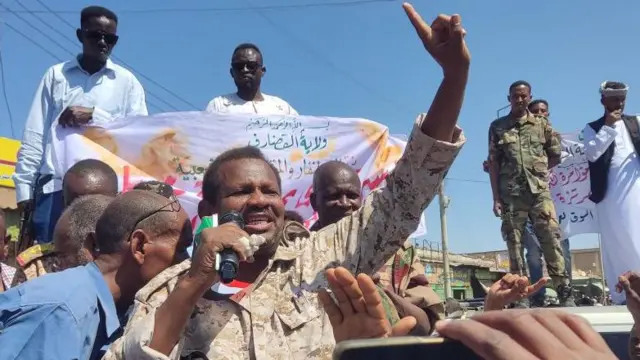
the Sudanese army says it has broken a near two-year siege imposed by the paramilitary Rapid Support Forces (RSF) on the key southern state capital of el-Obeid.
The breakthrough came hours after the RSF signed a political charter in the Kenyan capital, Nairobi, to establish a breakaway government in areas under its control.
The RSF and the army have been in a vicious battle for power since April 2023, with tens of thousands of people killed and millions forced from their homes.
The war has split the country, with the army controlling the north and the east while the RSF holds most of the Darfur region in the west and parts of the south.
El-Obeid, the capital of North Kordofan state, is a strategic hub connecting the capital, Khartoum, to Darfur. This is the latest army advance in recent weeks following the recapture of several parts of Khartoum from the RSF.
There was jubilation on the streets as Sudanese soldiers marched into the city.
A military spokesman, Nabil Abdallah, confirmed the gains in a statement, saying army forces had destroyed RSF units.
Finance Minister Jibril Ibrahim said the move was a “massive step” in lifting the RSF siege on el-Fasher, the capital of North Darfur province, and would also allow the delivery of humanitarian aid to Kordofan.
Sudanese civil society activist Dallia Abdlemoniem told the BBC Newsday programme that the recapture of the city “was “huge” and “significant”.
She said the RSF had “held the civilians captive for nearly two years” in the city.
The situation there was “horrific”, she said, adding that there had been no medical or food aid in an area considered “to be very risky in terms of famine and malnutrition”. —BBC.

60 beekeepers trained in Volta, Oti regions

Dagbon bows in majesty to bid farewell to Late Mion Lana

GTA official honoured for outstanding support to TOUGHA
Trending

 Politics9 months ago
Politics9 months agoVoter Register Discrepancies: NDC to stage nationwide protests against EC

 News10 months ago
News10 months agoArise Royals Montessori School Marks 2nd Graduation.

 News6 months ago
News6 months agoKing of Igbo Community in Ghana congratulates Mahama as President-elect of Ghana.

 Entertainment11 months ago
Entertainment11 months agoGhanaian musician Champions Gaza Peace with New Track

 More10 months ago
More10 months agoYoung people urged to develop their talents

 News11 months ago
News11 months agoCancer Support Network Foundation holds gala

 Entertainment11 months ago
Entertainment11 months agoSteps to receive an official GWR certificate – Details from mother of a Ghanaian record holder

 Women & Children10 months ago
Women & Children10 months agoPlan International Ghana Celebrates Milestone in Women’s Empowerment






